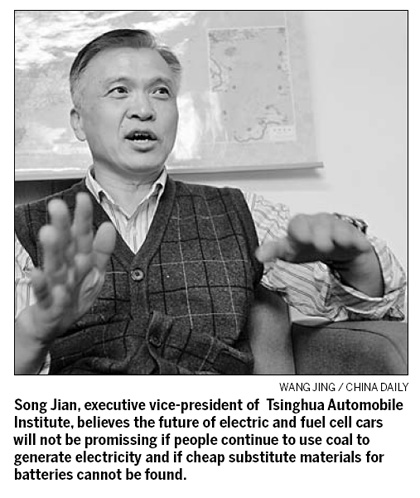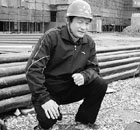Focus
Enviro car expert sees early grave for eco-car
By WANG CHAO (China Daily)
Updated: 2010-05-13 07:54
 |
Large Medium Small |

Song Jian, executive vice- president of Tsinghua Automobile Institute, could talk endlessly about all the success he has achieved in his 10 years of research on eco-friendly vehicles. Instead, he talked honestly with METRO about the frustrations he experienced and his predictions for the industry's future.
Q: When did you start carrying out research on green cars?
A: In 2000, eight years after Tsinghua University began its green car project. Before that, I worked in Beijing Second Automobile Works for 10 years.
Tsinghua University was among the first to undertake green car research and most of our energy was directed toward electric cars. There are two other important players in green car development: hybrid cars and fuel cell cars.
In Western countries, hybrid cars are recognized as an environmental and practical choice, but in China, we have paid closer attention to electric cars. Our plan was to surpass our Western counterparts in this field.
Q: How has that approach worked out?
A: Not great. We began at the same level as Western countries in 2000, but we are now a long way behind.
In that period, 3.8 billion yuan was invested in green cars, but little was spent on engine and battery development.
Q: How did the misuse of funds affect your research?
A: Several times I couldn't locate batteries and engines for the green car I was trying to build. I had to rely heavily on domestic providers, but most of the time, the available products failed badly.
When I then tried to import them from overseas, I was faced with extremely high prices that challenged my budget.
Q: On another point, can you tell us why Tsinghua University uses electric cars as in-campus transportation?
A: The project was initiated by my colleague Chen Quanshi. After the automobile institute launched its electric car project in 2001, we developed 20 electric buses for use within Tsinghua university campus.
However, they didn't last long and most are now powered by regular gas.
Q: Why did the project fail?
A: It was too expensive to run the buses. Each bus required a set of batteries that cost 200,000 yuan and which needed to be recharged daily.
With 200 being the limit on the number of times they could be recharged, we had to buy new ones every year. It cost us roughly 1,000 yuan for each day's use, for each bus, which was way too much.
Q: Was it then that you realized the problems facing electric cars?
A: Yes. Although electric cars look "green" with zero emissions, they aren't green in nature.
Most electricity in China is generated by coal. During this process, carbon dioxide is emitted. So, to recharge the cars, we still need to burn fossil fuels.
Additionally, the materials needed to make batteries - aluminum and boron - are seven to eight times more expensive than regular materials, like steel.
As a result, hybrid cars are the cheapest of the three alternatives. These types of car are 40 to 50 percent more fuel efficient than regular cars, but cost 100,000 yuan more than regular cars.
When gas touches $200 a barrel, hybrid cars will become very popular indeed.
Q: Will it ever be possible to commercialize electric cars?
A: I don't think so. Currently, no domestic manufacturer is capable of producing them in bulk, which suggests they can't earn enough money from selling them.
The government is subsidizing the industry heavily, but when the money stops, the manufacturers will probably close.
Even imported green cars don't sell well in China. In foreign countries people are more environment-oriented; so we still need further promotion here.
Q: What is the future of green cars in China?
A: If we continue to use coal to generate our electricity, and if cheap substitute materials for batteries cannot be found, there will be no future for electric and fuel cell cars.







